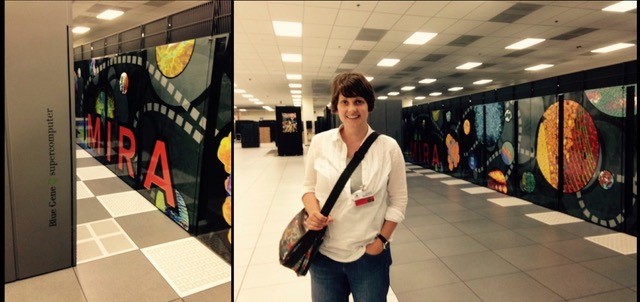‘Women and Science’ Series – Clever? Not really.
Dr Katy Clough is a postdoctoral researcher in gravitational physics with a focus on dark matter environments around black holes. She was previously an accountant and before that an undergraduate Engineer.

I’m a researcher in the astrophysics department at the University of Oxford, who works on numerical simulations of gravity. This involves studying black holes and the Big Bang using supercomputers, which all sounds very impressive. The usual response I get when I tell people that I am an astrophysicist is “you must be clever”. It’s a difficult statement to respond to because, whilst I certainly like to think I’m not stupid, behind it is whole host of misconceptions about what scientists are like, for which the standard response of “well, not really”, is inadequate.
We tend to tell ourselves stories about how an elite few follow the right paths, and are somehow predestined to discover important things in scientific fields. And often we judge ourselves against these imaginary people, and find ourselves lacking the necessary “special” qualities to be truly great scientists. Did Einstein fail at maths at school, or was that part of his rebellious genius? This question should be irrelevant to you – there is no such thing as the right path to science, and you can and should create your own story.
So below I have listed the three things that I would say, were it socially acceptable to respond to casual chit chat with a small lecture (note to self – it isn’t).
- I do not know the names of the constellations, except Orion (and everyone knows that)
The presentation of science in many popular programs is as a series of facts about the universe which one learns – the names of the planets, the distance to the nearest star, the masses of particles. But this is not what science is – fortunately, because then it would be very tedious! Science consists in understanding the connections between different phenomena, the processes by which things occur and the use of mathematical models to predict what should be observed. The reward for the effort you put in to understanding this is a deeper insight into the Universe. Did you know that the Earth is not flat? Hopefully yes – most of us feel a bit sorry for those who think it is. But did you know that space-time is not flat? Just like saying the Earth is not flat, this statement is more than a simple fact – it changes the way you understand our place in the cosmos. You are missing out if you don’t explore it.
- I rarely understand difficult concepts immediately, and I use a calculator to add big numbers
I constantly tell my students that learning is not a linear process – sometimes you may struggle, and sometimes you have to practice many problems without fully understanding what you are doing before suddenly the fog clears and you see how everything fits together. Good scientists need to be willing to immerse themselves in a question without being sure that they can find an answer, to make mistakes, and to ask others with more expertise to help them. So yes, I struggle with new ideas, but this is just a sign that they are challenging and thus interesting. I also don’t have savant-like abilities in mental arithmetic, but that is not a barrier to me participating in science, given that calculators are now widely available.
- I did not always know that I was destined to be scientist, nor was I plucked from obscurity by someone who recognised my potential.
If you do not see people like you winning the Nobel Prize, for example, because you are female, working class, or from an ethnic minority, it is unlikely that you will have thought of yourself as a future Einstein. I chose A-levels in maths and physics because I knew it would minimise the amount of time I spent doing homework, not because it would lead me to a scientific career (although happily, it did). Since I wasn’t sure what I wanted to do, I spent many years of my life waiting for a tap on the shoulder from someone who would say “Katy, we have noticed how talented you are, and we need you to do X”, X being something interesting, exciting and important. This did not happen, and I have to confess that initially it was a pretty big disappointment – am I not good enough? But I have since realised that I am good enough, and I can work in a field which is interesting, exciting and important – I just had to choose it for myself.